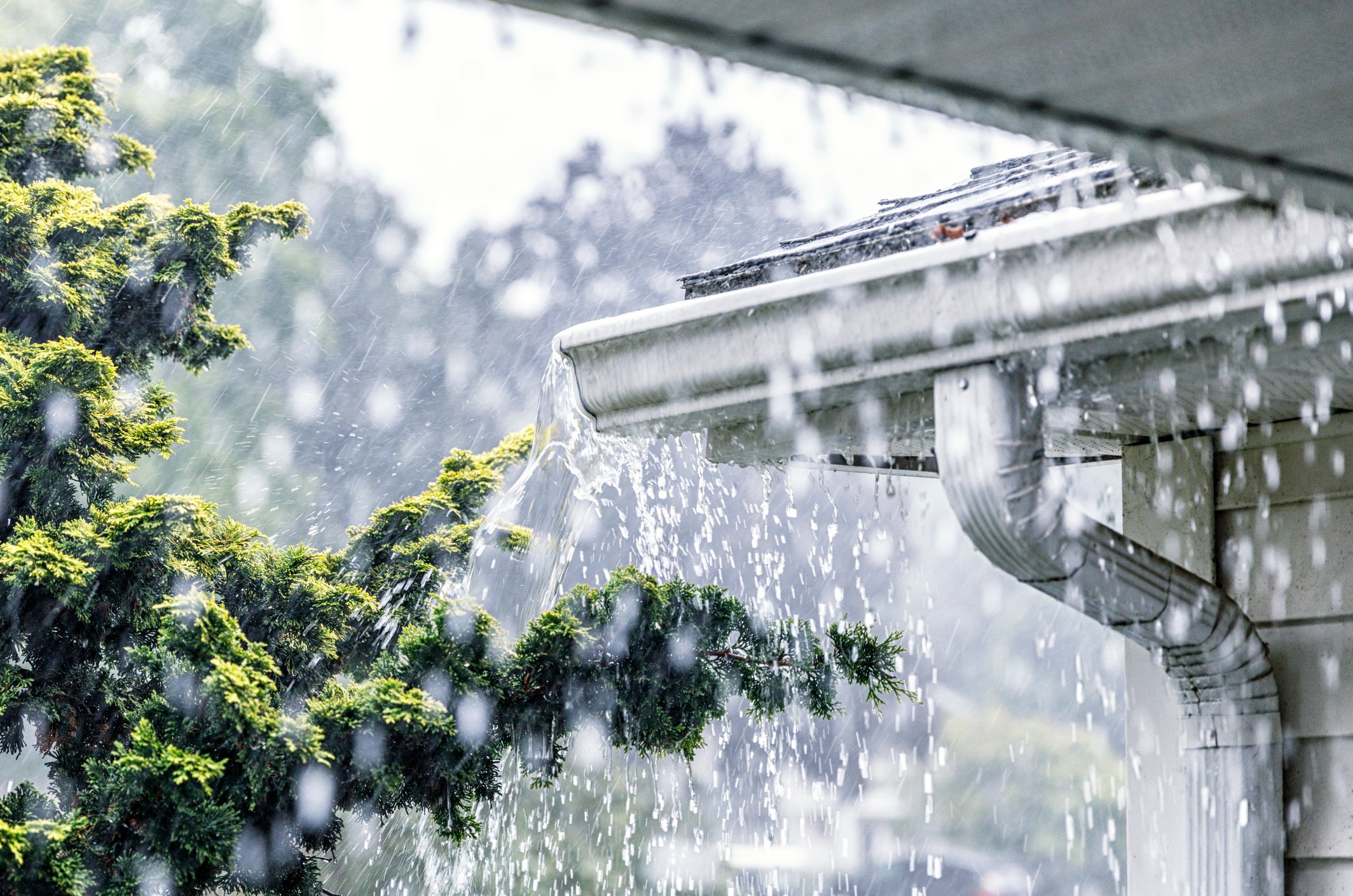A rain gutter’s purpose is to protect the exterior of the home by controlling rainwater and diverting the water away from the roofline and foundation. What you may not know is to what extent neglecting your rain gutters are costing you. If ignored, leaves and other debris can block rain gutters and reroute the water to the roof, the foundation and can even damage your landscape below, resulting in thousands of dollars in repairs. But before we get into all of that, you must first understand how rain gutters work.
What Do Rain Gutters Do?
Rain gutters have a thankless job and odds are you probably only notice them when there’s a downpour. You hear excessive dripping, look out your window and find that your gutters are clogged and are creating a big mess and an even bigger headache.

How Do Rain Gutters Work?
Rain gutters work by catching rainwater from the roof and channeling the water to a downspout and onto a splash block where the water silently and safely disperses onto the ground. This distribution of water protects the landscape from deteriorating and reduces the risk of flooding.
How Often Should I Clean My Rain Gutters?
Rain gutters should be cleaned twice a year, once in the spring and again in the fall.
Combined with cleaning, gutters should be inspected twice a year. This will help ensure water is flowing correctly, and there are no cracks, loose parts, or other damages. 
What Happens If I Don’t Clean My Rain Gutters?
The expression when it rains it pours is exceptionally true when it comes to not maintaining your rain gutters. When neglected, rain gutters can cause a laundry list of problems.
Debris build-up in gutters and spouts
Over time rain gutters can collect leaves, twigs, and other debris that can gunk up and clog drain spouts.
Gutters become a breeding ground for pests
Debris-filled gutters are a favorite destination among birds, bees, wasps, mosquitos, and even termites. These pests can carry diseases, cause structural damage to your home, and make a gigantic mess.
Rain gutters start to get heavy and pull away from the house
The accumulation of debris and water can weigh down rain gutters, causing the gutter to detach from the home. This is especially true in the wintertime when gutters are likely to freeze if not cleaned, making them more susceptible to dangerous icicles and slip and fall accidents.
The roof starts to collect rainwater
The last thing you want is a leaky roof. When rain gutters are full of debris, the water must reroute elsewhere; usually pooling on the roof. If water collects on the roof for too long, it can damage roof tiles, fascia, eaves, and the roof deck.
Water spills into windows and erodes the foundation
Rainwater can flow along the exterior walls and seep into windows exposing your home's interior to mold spores. Meanwhile, your home's foundation is weakening from the constant flow of water caused by unkept rain gutters.
Excess water can damage landscaping
When clogged, rain gutters can spill over into the yard's landscape, killing various landscaping elements and decreasing curb appeal.
The Cost of Not Cleaning Your Rain Gutters
Maintaining rain gutters is relatively cheap compared to the price you would pay to repair damages. Here's a list of the costs from some of the damage you might expect if you don’t maintain your gutters:
Roof replacement: $6,750
Foundation repair: $4,511
Fascia repair: $541
Pest extermination: $250
Gutter replacement: $1,050
Tenant vs. Landlord: Who’s Responsible for Cleaning Rain Gutters?
When considering what’s at stake, rain gutter cleaning is best left for the landlord. It’s common for tenants not to have the proper equipment, know-how, or have a sense for the same concerns a landlord might about maintaining rain gutters.
Tenants do not want to put the time and energy into cleaning gutters
Even though tenants might feel irritated by the mess clogged gutters can create, gutter cleaning typically gets brushed off and left for the landlord, or even the next tenant.
Tenants typically care about cosmetic upkeep
Tenants only maintain what is visible. Unless they’re falling off of the house, rain gutters are at the bottom of the tenant’s to-do list.
Tenants do not have the equipment to clean rain gutters
Basic gutter cleaning requires a ladder, hand trowel, gloves, garbage bags, and an extra-long garden hose – tools most tenants do not have.
Tenants do not have the know-how to clean rain gutters
Even if a tenant were to have access to all the necessary tools to clean rain gutters, do they know how to do it? While gutters may seem like a simple cleaning chore, it involves assessing the condition of the gutter, carefully removing debris, and detaching various connector parts.
Tenants will stay longer if they have fewer responsibilities
People tend to rent because it’s more flexible and has fewer responsibilities than owning a home. Making the tenant responsible for duties that they have little or no control over can decrease their satisfaction, causing them to look elsewhere.
DIY or Hire an Expert to Clean Rain Gutters?
If you’re contemplating doing it yourself, consider the number of properties you manage. While a homeowner with only one property may feel more inclined to personally clean rain gutters, a property manager or landlord who has multiple properties should consider hiring a professional gutter cleaner.
Hiring an expert to clean rain gutters can minimize risk
It’s likely that you don’t spend every day on a ladder or aren’t scaling house, but guess who does? That’s right. A gutter cleaning expert. Cleaning gutters can be very dangerous and an experienced, licensed, and an insured expert can help ensure it’s done safely – without you or your tenant ever stepping foot on a ladder.
An expert can achieve quality results
Clean rain gutters can prevent damage to your roof and exterior walls. Hiring a knowledgeable gutter cleaning expert can help to ensure gutters are intact and in good working condition.




Let Us Know What You Thought about this Post.
Leave a comment below.